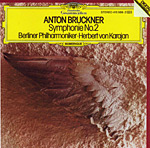Bruckner’s Symphony No. 2 was among the better efforts in Karajan’s complete cycle. On this work he lavished the rich, cultivated sound of his Berlin Philharmonic, with its burnished brass and bright, singing strings. Karajan was particularly fond of horns (as was Bruckner), and he took every opportunity to emphasize their unique sonority–whether or not the composer intended for them to be heard so prominently. However, while the weighty horn sound helps the music, Karajan’s heavy tempos sometimes do not, especially in the slow movement, which here sounds as if he’s trying turn it into the Eighth Symphony’s great Adagio.
That said, the conductor does generate considerable energy in the first and last movements–which brings us to the recorded sound. Bruckner’s symphonies make extensive use of dynamic extremes, but unfortunately this element is all but ruined in Karajan’s recordings due to their flattened dynamic range. Also, the bizarre balances that place the strings so close you can almost smell the rosin allow no spatial perspective for the listener. As the conductor was extensively involved in the production of his recordings, you have to consider their sound as an aspect of his interpretation. Perhaps Karajan devotees won’t mind, but others should be prepared to listen past the recording’s considerable limitations. Available from Arkivmusic.com.
































